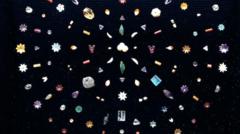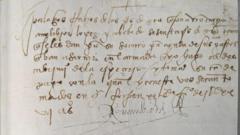The auction not only targets collectors but raises profound ethical questions surrounding the treatment of sacred artifacts.
**Buddha-Linked Jewels Spark Ethical Concerns as Sotheby’s Auction Approaches**

**Buddha-Linked Jewels Spark Ethical Concerns as Sotheby’s Auction Approaches**
A stunning collection of jewels tied to Buddha's relics is set for auction, igniting a debate on their rightful ownership and cultural significance.
The upcoming Sotheby’s auction in Hong Kong will feature a remarkable trove of nearly 1,800 gems—pearls, rubies, sapphires, and patterned gold sheets—connected to the remains of Buddha, marking one of the most significant archaeological finds of our time. These treasures were unearthed from a stupa in Piprahwa, India, in 1898 by English estate manager William Claxton Peppé, who discovered them alongside bone fragments believed to belong to the Buddha.
Many experts now express unease concerning the sale of such culturally and religiously significant items, questioning the ethics of transferring ownership of what could be deemed priceless heritage. Naman Ahuja, a prominent Delhi-based art historian, articulated this sentiment, challenging the legitimacy of an auction for what he considers irreplaceable elements of Buddhist history.
Despite the Peppé family's assertions that they explored donation options and found few viable paths, critics like Amal Abeyawardene from the British MahaBodhi Society voiced their concerns about the implications such sales have in the context of Buddha's teachings on rights and respect for sacred objects. The family, which inherited the jewels from previous generations, believes that an auction facilitated by Sotheby’s might ultimately aid in transferring the relics to Buddhist communities seeking deeper connections with their heritage.
With an array of opinions swirling around the impending auction, ethical questions loom large: Should human remains be commodified? Who is truly positioned to determine ownership rights in these cases? As the auction approaches, the fate of these extraordinary jewels intertwines with broader discussions on colonialism, cultural heritage, and respect for sacred relics.
Many experts now express unease concerning the sale of such culturally and religiously significant items, questioning the ethics of transferring ownership of what could be deemed priceless heritage. Naman Ahuja, a prominent Delhi-based art historian, articulated this sentiment, challenging the legitimacy of an auction for what he considers irreplaceable elements of Buddhist history.
Despite the Peppé family's assertions that they explored donation options and found few viable paths, critics like Amal Abeyawardene from the British MahaBodhi Society voiced their concerns about the implications such sales have in the context of Buddha's teachings on rights and respect for sacred objects. The family, which inherited the jewels from previous generations, believes that an auction facilitated by Sotheby’s might ultimately aid in transferring the relics to Buddhist communities seeking deeper connections with their heritage.
With an array of opinions swirling around the impending auction, ethical questions loom large: Should human remains be commodified? Who is truly positioned to determine ownership rights in these cases? As the auction approaches, the fate of these extraordinary jewels intertwines with broader discussions on colonialism, cultural heritage, and respect for sacred relics.






















